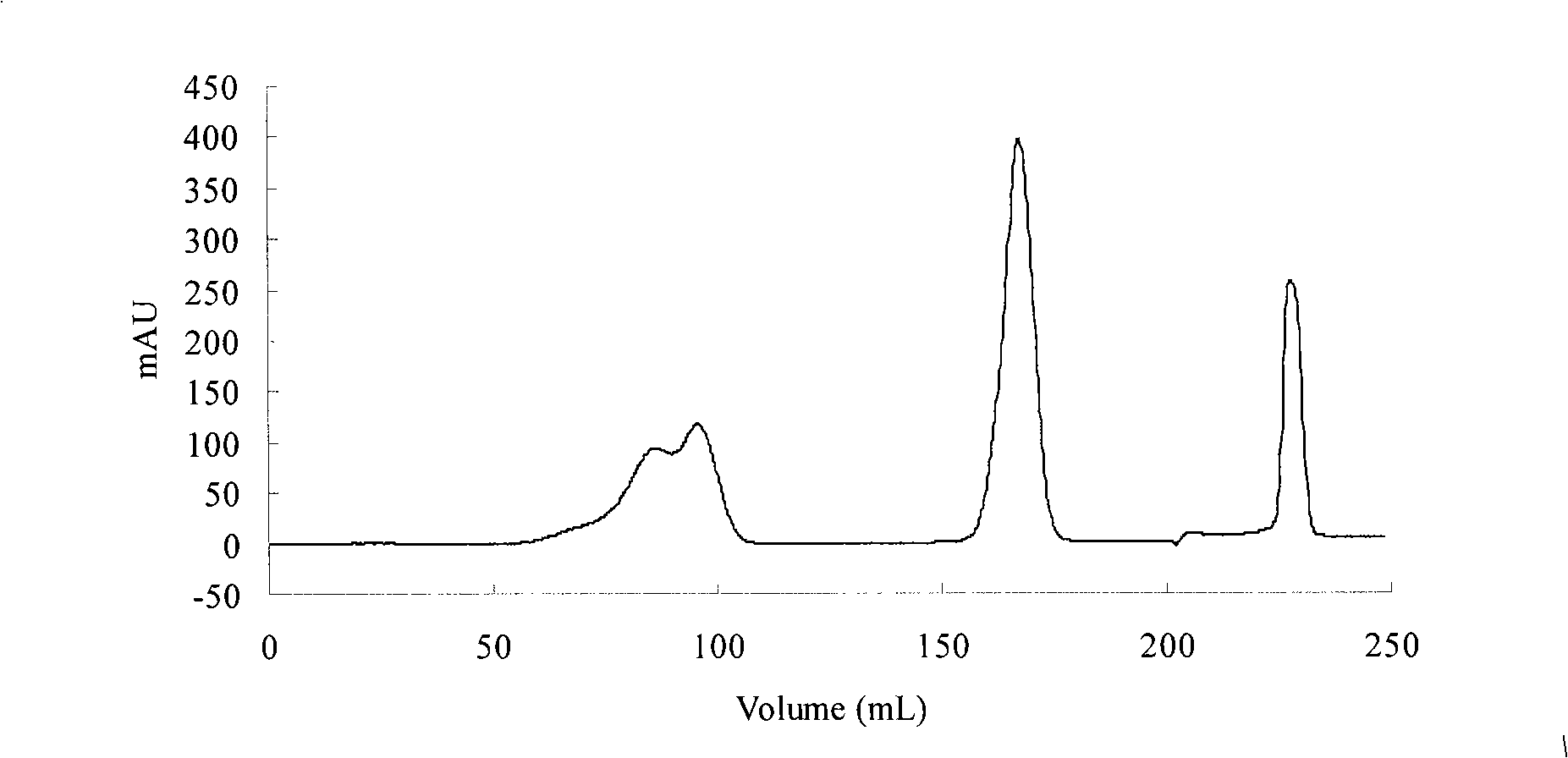Method for separating and purifying sea-mussel mucin by using mixing adsorption chromatography
A mussel mucin and adsorption chromatography technology is applied in the field of separation and purification of mussel mucin using mixed adsorption chromatography, which can solve problems such as low yield of mussel mucin, and achieve high selectivity, simple process and high protein yield. Effect
- Summary
- Abstract
- Description
- Claims
- Application Information
AI Technical Summary
Problems solved by technology
Method used
Image
Examples
Embodiment 1
[0026] Embodiment 1, using Superose 12 medium mixed adsorption chromatography to separate mussel mucin
[0027] 1) Using 0.5% perchloric acid and 2% acetic acid as the extraction solvent, add 400ml of extraction solvent to 100g mussel foot silk, extract at 18°C for 12min, crush the frozen mussel foot silk at high speed with a stirrer to evenly suspend it in in the extraction solvent;
[0028] 2) centrifuge at 12000r / min for 35min, and keep the supernatant;
[0029] 3) Sephadex G-50 was used to remove small molecular compounds, the mobile phase was 20mM sodium acetate buffer solution with pH 2.5, 0.15M sodium chloride was added, and the breakthrough peak was collected;
[0030] 4) Concentrate fractions with Millipore CENTRIPLUS ultrafiltration membrane;
[0031] 5) Superose 12, column volume 50ml, eluent including 0.15M sodium chloride, 0-300ml, trifluoroacetic acid 0.02-2% for gradient elution;
[0032] 6) Concentrate fractions with Millipore CENTRIPLUS ultrafiltration me...
Embodiment 2
[0038] Embodiment 2, using Superose 12pg medium mixed adsorption chromatography to separate mussel mucin
[0039] 1) Using 1% perchloric acid as the extraction solvent, add 100g mussel foot silk to 300ml extraction solvent, extract at 15°C for 15 minutes, use a stirrer to crush the frozen mussel foot silk at high speed to evenly suspend it in the extraction solvent;
[0040] 2) Remove the residue by filtering with a 45 μm filter membrane, and keep the supernatant;
[0041] 3) Sephadex G-25 was used to remove small molecule compounds, the mobile phase was 30mM sodium acetate buffer at pH 3.0, 0.2M sodium chloride was added, and the breakthrough peak was collected;
[0042] 4) Concentrate fractions with Millipore CENTRIPLUS ultrafiltration membrane;
[0043] 5) Use Superose 12pg, column volume 50ml, eluent includes 0.2M sodium chloride, 0-300ml, acetic acid 0-20% gradient elution;
[0044] 6) Concentrate fractions with Millipore CENTRIPLUS ultrafiltration membrane;
[0045] 7...
PUM
 Login to View More
Login to View More Abstract
Description
Claims
Application Information
 Login to View More
Login to View More - R&D
- Intellectual Property
- Life Sciences
- Materials
- Tech Scout
- Unparalleled Data Quality
- Higher Quality Content
- 60% Fewer Hallucinations
Browse by: Latest US Patents, China's latest patents, Technical Efficacy Thesaurus, Application Domain, Technology Topic, Popular Technical Reports.
© 2025 PatSnap. All rights reserved.Legal|Privacy policy|Modern Slavery Act Transparency Statement|Sitemap|About US| Contact US: help@patsnap.com


